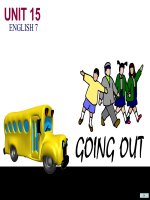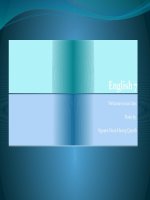Unit 15 Going out
Bạn đang xem bản rút gọn của tài liệu. Xem và tải ngay bản đầy đủ của tài liệu tại đây (169.79 KB, 8 trang )
<span class='text_page_counter'>(1)</span>Planning date 29/3/2016 Period 91.. Unit 15: going out lesson 1: a1. p.147.. I. Aims: - To help ss further practice in Wh - questions and giving advice for not doing something. - To develop ss’skills. II. Objectives: By the end of the lesson, ss will be able to give advice for not doing something. III. Ways of working: T - WC, pair work, individual work. IV. Materials: Text book, pictures, tape, cards. V. Anticipated problems: VI: Teaching steps: 1. Warm up: (1 minute) Greet wand check the ss’attendance. 2. Revision: 3. New lesson:. STAGES PRESEN TATION (16 minutes). ACTIVITIES * Preteach: - Teacher uses techniques to teach students new words. - Teacher sets the scene, plays the tape and elicits the model sentences. - Concept checking: + What do these sentences mean? + When do we use these sentences? +What kind of sentence is the question? + Which word do we use at the beginning of the sentence? Next? + How do we promiss? PRACTICE * Comprehension questions: (13 A1. P.147 (a - g) minutes) - Students answer the question A1. P.147.. PRODUC TION (12 minutes). * Mapped dialogue: Example exchange: S1: Where are you going? S2: I'm going to the amusement center. S1: What are you going to do? S2: I'm going to play video games. S1: How often do you play?. ON BOARD I. New words: - the amusement center: trung t©m gi¶i trÝ - addictive (adj): g©y nghiÖn - the arcade: khu vui ch¬i gi¶i trÝ cã m¸i vßm II. Model sentences: - Don't spend too much time in the arcade. - No, I won't.. III. Answer the comprehension questions: A1. P.147: * Answer key: a) He's going to the amusement center. b) He's going to play video games. c) He goes to the amusement center about once a week. d) No, he doesn't. He doesn't spend much money. e) He usually stays for about half an hour. f) Nam must be careful because video games can be addictive. g) He'll do his homework later. * Mapped dialogue: You Where... going? What ...... do? How often......? Don't spend..... Your friend ... amusement center. Video games. ......2 / week..
<span class='text_page_counter'>(2)</span> S2: Twice a week. video games. S1: Don't spend too much time Don't forget........ playing video games. homework. S2: No, I won't. S1: Don't forget to do your homework. S2: No, I won't. 4. Consolidation:(1 minute) - Ss retell the main points of the lesson: 5. Homework: (3 minutes) - Learn by heart all the new words and model sentences. - Read the dialogue A2. P.147 again. - Do exercise: A1. P.94 (workbook). Planning date :3/4/2016 Period 92.. X X. Unit 15: going out Lesson 2: A2.A3 p.148 - 149.. I. Aims: - To help students read for details about videos and video games. - To develop students' skills. II. Objectives: By the end of the lesson, students will be able to understand the reading and understand more about video. III. Ways of working: T - WC, team work, individual work. IV. Materials: Textbook, pictures, additional board. V. Anticipated problems: The lesson may take time. VI. Teaching steps: 1. Warm up: (1 minute) Greet and check the students' attendance. 2. Revision: (4 minutes) Students do exercise A1 (Homework) 3. New lesson: STAGES ACTIVITIES ON BOARD (PRE * Preteach vocabulary: I. New words:.
<span class='text_page_counter'>(3)</span> READING - Teacher uses techniques to (12 teach students new words. minutes) - Checking understanding: * What and where:. - dizzy (adj): chãng mÆt - social skill: kÜ n¨ng x· héi - an inventor: nhµ ph¸t minh - the premise /p'remis/: nhµ cöa, vên tîc - the industry: c«ng nghiÖp - a robbery: vô cíp * True / False prediction: II. True / False prediction: - Students predict whether the 1. Children like playing video games statements true or false. because they are good fun. 2. It's very good for children to spend too much time on their own. 3. Playing video games for a long time can make children become dizzy. 4. Children mustn't play outdoors with their friends. 5. Some inventors become rich when they are very young. WHILE * Reading: A2. P148: III. Reading: A2. P.148: READING - Students read the text for the 1. Checking true - false predictions: (15 first time and check their * Answer key: minutes) predictions. 1. T 2. F 3. T 4. F 5. T 2. Matching: (With answer key) - Students read the text again L4: careful ch¬i ngoµi trêi and guess the meaning of the L9: play outdoors quªn given words. L9: develop ph¸t triÓn L12: forget cÈn thËn 3, Multiple choice: - Students read again and do * Answer key: the multiple choice. a) D b) A c) D d) B POST *Grid: READING - Students complete the grid, (10 answer the the questions: minutes) "What should we do? What shouldn't we do?" Eg exchange: S1: We should play outdoor S2: Yes, we should. II. What should we do? What shouldn't we do? (With answer key). Activities in free time should shouldn't Play outdoors Play video games for a long time Take part in activities with friends Spend a little time playing video games Spend too much time on your own. 4. Consolidation:(1 minute) - Ss retell the main points of the lesson: 5. Homework: (2 minutes) - Learn by heart all the new words and read A2 again. - Do exercise : A3. P.96 (workbook) * Teacher guides students to do the exercise: Planning date :5/4/2016 Period 93.. Unit 15: going out lesson 3: b1, 2. p.150 - 151.. I. Aims: - To help students read for details about life in the city and life in the country. - To develop students' skills..
<span class='text_page_counter'>(4)</span> II. Objectives: By the end of the lesson, students will be able to understand the reading in details. III. Ways of working: T - WC, team work, individual work. IV. Materials: Textbook, tape, additional board, color chalk. V. Anticipated problems: The "discuss" activity may be difficult for some students. VI. Teaching steps: 1. Warm up: (1 minute) Greet and check the students' attendance. 2. Revision: (5 minutes) * Wordsquare: * Answer key: h r o B h g i e n o c l U b z w s c neighborhood o z k S J v q i e quiet, noise, village d r s Y m n t o g traffic, club m z j R k y t n a city o p c O q z e j l busy road t t r A f f i c l motorbike o x l D r n u b i r b i K e s q k v 3. New lesson: STAGES ACTIVITIES ON BOARD PRE * Preteach I. New words: READING vocabulary: - the rest: phÇn cßn l¹i (9 - (to) awake: thøc giÊc - Teacher uses minutes) techniques to teach - (to) scare: sî - (to) get used to: quen víi students new words. - Checking * Brainstorming: understanding: crowded life in the city Rubout and remember. noisy * Brainstorming: know neighbor well cheap boring. life in the country. quiet. less entertainment. While * Read: B1. P.150 II. Read: B1. P.150 reading - Students read the 1. Answer the questions. P.151: (17 dialogue and add some * Answer key: minutes) more information to the a) She goes to the school theater club once a week. brainstorming. The rest of the week she usually stays st home in - Students read the the evening. dialogue again and b) No, she doesn't like the city. answer the c) Before Hoa lived in a village near Hue. comprehension d) She liked living there because she knew all the questions. people in her neighborhood; the village was quiet and there was little traffic. e) She doesn't like the city because it is noisy and the roads are very busy. f) She hates crossing the roads most because bikes, motorbikes and cars come from every direction and they scare her. POST * Discussion: III. Discussion:B2. P.151 READING - Students discuss 1. Do you like the country or the city? Why? Why (10 about life in the city not?.
<span class='text_page_counter'>(5)</span> minutes). and life in the country. 2. What do you like most about the city? Why? 3.What do you like most about the country?Why? 4. Consolidation:(1 minute) - Ss retell the main points of the lesson: 5. Homework: (2 minutes) - Learn by heart the new words + Do exercises: B1. B2. P.96 (workbook) - Prepare B3, B4 (textbook). Planning date :7/4/2016 Period 94.. Unit 15: going out lesson 4: b3, 4. p.151 - 152.. I. Aims: - To help students know some activities in the evening and practise listening and reading skills. II. Objectives: By the end of the lesson, students will be able to understand the reading and listening III. Ways of working: T - WC, individual work. IV. Materials: Textbook, tape. V. Anticipated problems: Listening may be difficult for some students. VI. Teaching steps: 1. Warm up: (1 minute) Greet and check the students' attendance. 2. Revision: (4 minutes) Students answer teacher's questions: - Do you like the city? Why? Why not? - Do you like to live in the country? Why? Why not? 3. New lesson: STAGES ACTIVITIES ON BOARD PRE * Prediction:B4. P.152 I. Prediction: LISTENIN - Students look at the pictures 1. Picture a): Play chess (Ba?) G and give the activity of each 2. Picture b): play table tennis ....?.... (4 picture. 3. Picture c): Listen to music ...?.... minutes) - Students guess and write the 4. Picture d): go to the movie theatre ..?... names Hoa, Lan, Nga, Nam, Ba, 5. Picture e): play football ...?.... An next to the picture. 6. Picture f): go to a restaurant ...?.... WHIILE * Listen: B4. P.152 II. Listen: B4. P.152 LISTENG - Students listen and check their * Answer key: (6 predictions. 1. Picture a): Play chess Hoa minutes) - Students listen again and 2. Picture b): play table tennis Ba teacher give the correct answers. 3. Picture c): Listen to music Nam * Tapescript: 4. Picture d):go to the movie theatre Nga Yesterday evening, Ba played 5. Picture e): a football match An table tennis. Nga saw a movie. 6. Picture f): go to a restaurant Lan Lan went to a restaurant. Hoa played chess. Nam listened to CDs. An watched a soccer match. PRE * Preteach vocabulary: III. New words: READING - Teacher uses techniques to - rarely (adv): hiÕm khi (8 teach students new words. - (to) socialize: x· héi hãa minutes) ~(with sb): hßa nhËp víi.... * Prequestion: * Predict the answer to these question: 1. What did Hoa and her friends do in the evening? WHILE * Read: B3. P.151 IV. Reading: B3. P.151:.
<span class='text_page_counter'>(6)</span> READING - Students read the text and (13 answer the prequestion. minutes) - Students read again and answer the teacher's questions: (*Key: a) Because they were too far expensive. b) Yes. c)No. Because there wasn't a library there. d) From the public library. e) Because she got used to it). 1. Answer the prequestion: - They talked and listened to music or helped each other with their homework. Sometimes they played table tennis,..... went to the library. 2. Answer the questions: a) Why did Hoa rarely go to see movies or eat out in the evening? b) Did Hoa like to read? c) Could Hoa read many books in her village? Why? d) Who could Hoa borrow books in the city? e) Why did Hoa decide that the city wasn't so bad after all? V. Writing: In the evening Hoa often goes out. She usually visits her friends............ POST * Write: READING - Students write the thing Hoa (6 often does in the evening (use minutes) the present simple tense) 4. Consolidation:(1 minute) - Ss retell the main points of the lesson: 5. Homework: (2 minutes) - Learn by heart the new words and read B3 again. - Do exercise: B3. P.97 (workbook). Planning date :9/4/2016 Period 95. . Unit 15: going out. lesson 5: b5. p.153 I. Aims:.
<span class='text_page_counter'>(7)</span> -By the end of the lesson , Ss will be able to do some difficult exercices. - Develop Ss’ four skills. II. Objectives: -By the end of the lesson, Ss will be able to do some difficult exercices. III. Ways of working: T - WC, teamwork, pair work, individual work. IV. Materials: Textbook,exercice book . V. Anticipated problems: VI. Teaching steps: 1. Warm up: (1 minute) Greet and check the students' attendance. 2. Revision: (7 minutes) Slap the board play out doors. play with friends. on your own. play video games. take part in activities 3. New lesson:. STAGES PRESEN TATION (10 minutes). ACTIVITIES ON BOARD * Gap fill: A3. P.149: I. A3. P.149: Complete the passage with - Students complete the text the words in the box. about videos by filling in the * Answer key: gaps with the words given. 1. be 2. have 3. is 4. identify Then discuss with their 5. are 6. use 7. 8. will friends about the headline of can the paragraphs of the text 9. buy 10. show - (C¸c m¸y ghi h×nh ë siªu thÞ gäi lµ: security camera surveillance camera close circuit camera) PRACTICE * Practice:B5 II. Practice:B5 (12 - Students read the ‘Play with - Students read the ‘Play with words’ . minutes) An evening out words’ . I had a terrible evening. I went to the movie, But it was boring. I had a burger. It was very nice. But I didn’t like the price. In addition to that, My bike tires were flat. And to add to my pain, It started to rain. But don’t worry – I won’t go out again in a hurry! PRODUC *T explains some difficult III/ Viết câu sử dụng từ gợi ý: TION exercices. (12 -Ask Ss to do the exercice. 1/ Videos / be / very / useful / education 2/ you / like / visit / museums / ? minutes) 3/ TV viewers / can / join and answer questions / telephone / or / mail. 4/ Would you like / go / the movies / this week / ? 5/ She / going to / see a plan / her parents. 6/ There / be not / good programs / teenagers. * Answers: 1/ Videos are very useful in education.
<span class='text_page_counter'>(8)</span> 2/ Would you like to visit the museums ? 3/ TV viewers can join in and answer questions through telephone or by mail. 4/ Would you like to go to the movies this week ? 5/ She is going to see a plan with her parents. 6/ There are not good programs for teenagers. 4. Consolidation:(1 minute) - Ss retell the main points of the lesson: 5. Homework: (2 minutes) - Learn by heart the model sentences. - Do exercise in the workbook.
<span class='text_page_counter'>(9)</span>






